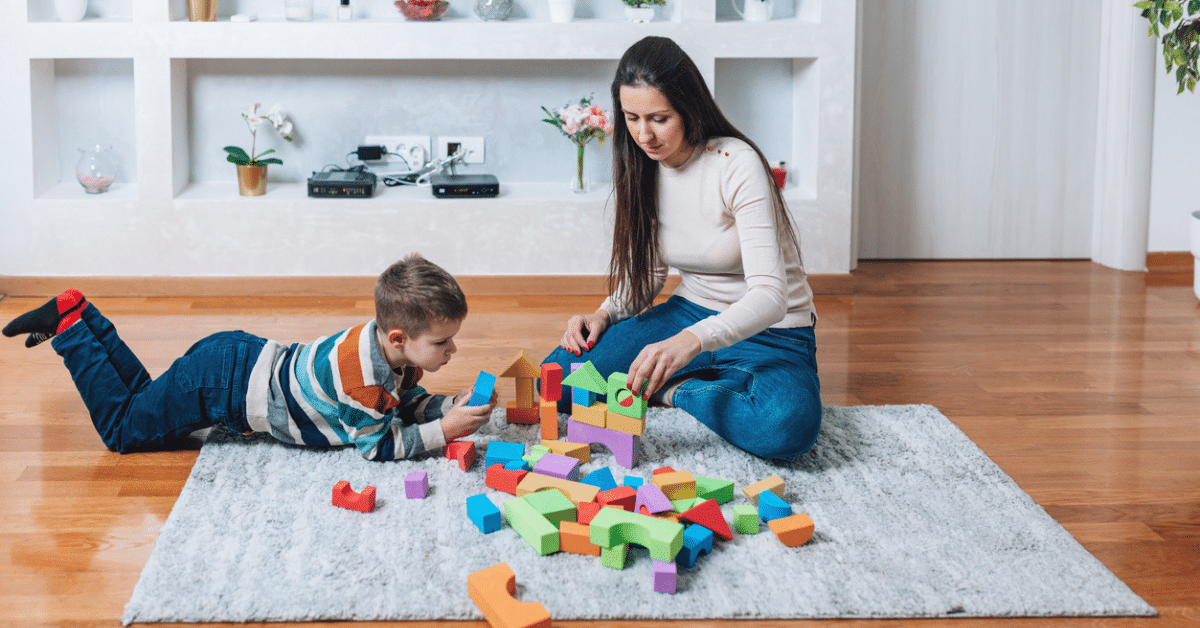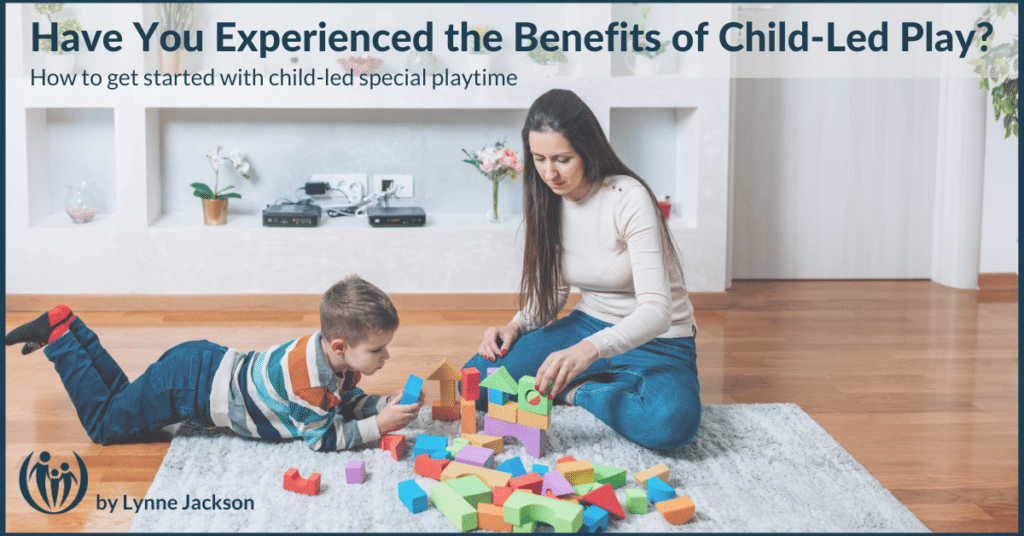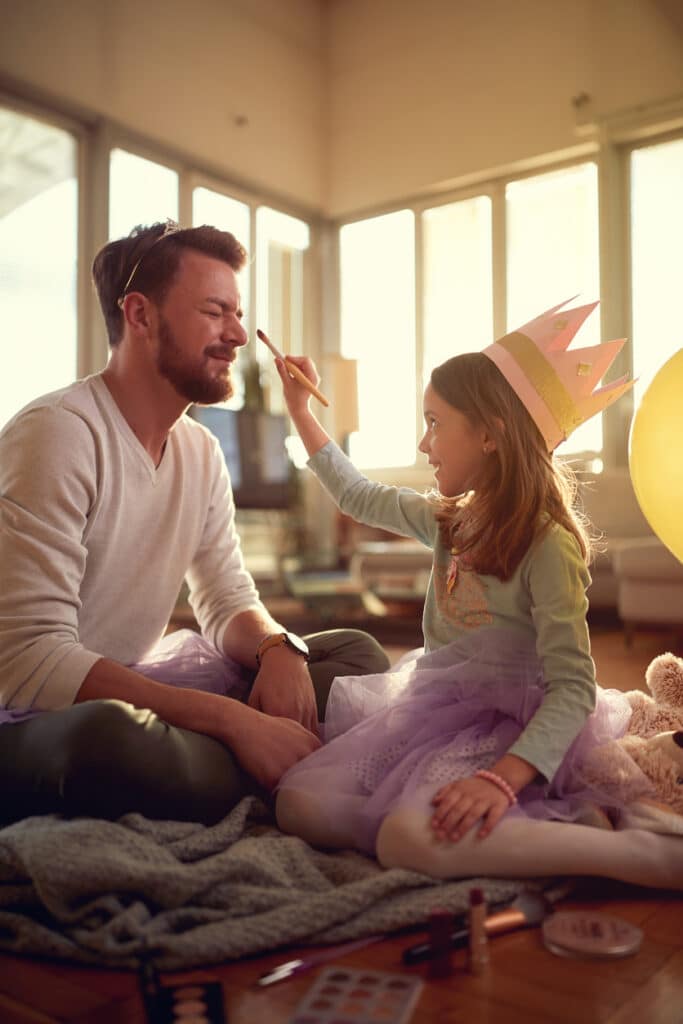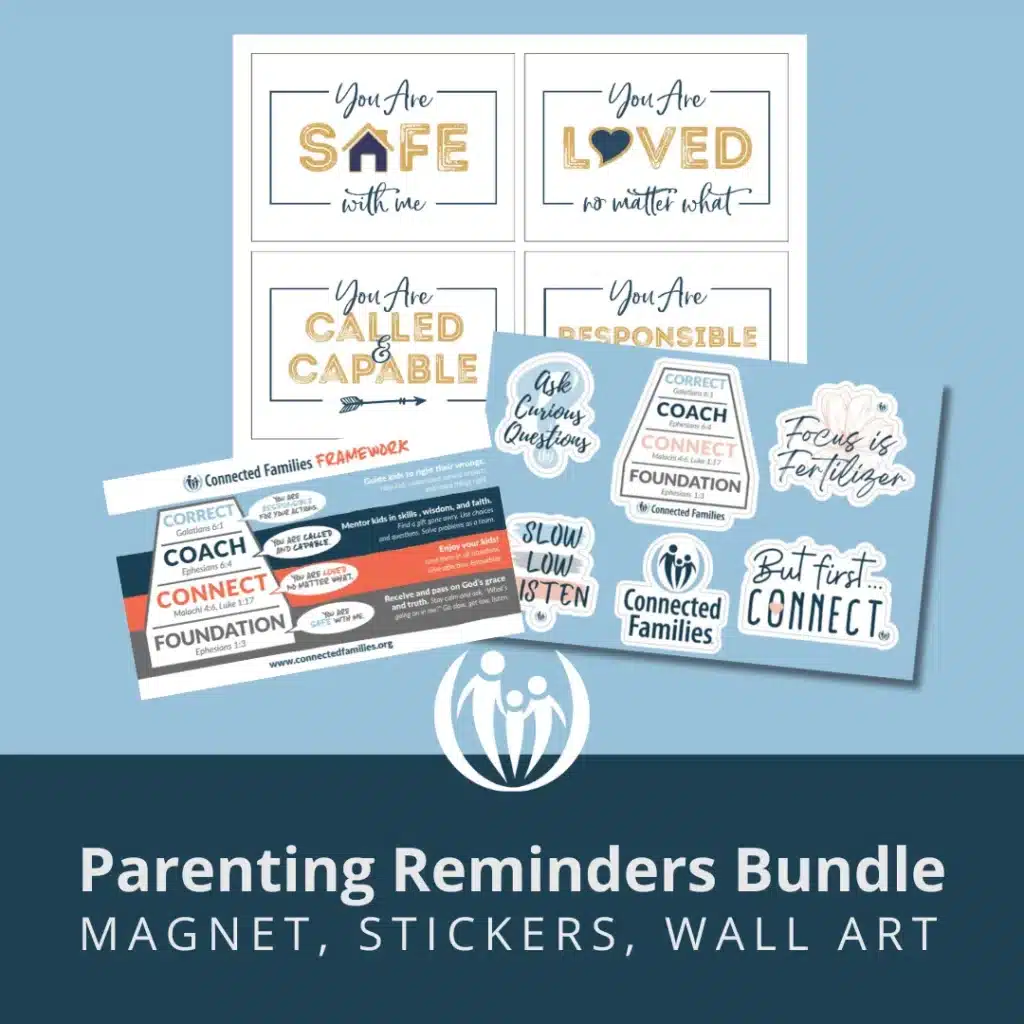
Have You Experienced the Benefits of Child-Led Play?
How to get started with child-led special playtime

This article is adapted from content shared by Marlee Thomsen, LCSWA and Connected Families Certified Parent Coach, with credit to her sources at the end of the article.
Do you frequently feel at odds with your child, discouraged by stress and disconnection in your relationship? If so, child-led play can be life-giving for both of you. This unique type of play helps with so many kinds of challenges!
What is child-led play?! (a.k.a. “special playtime” with YOU)
Child-led “special playtime” is intentional playtime in which your attention is focused only on your child (no phone!). The child leads the play while you follow along with your words and body language and participate as they direct. You reflect feelings back to your child, encourage your child’s efforts, and help your child take responsibility for their actions.
4 reasons to engage in child-led play
1. You feel disconnected from your child and weighed down by behavior challenges. Child-led special playtime can infuse your relationship with connection and refreshment and give you eyes to see your child differently. When your child feels loved and encouraged, behavior challenges usually decrease significantly.
In his book Playful Parenting, Lawrence Cohen, PhD, says, “Play is the long-sought bridge back to that deep emotional bond between parent and child. Play, with all its exuberance and delighted togetherness, can ease the stress of parenting. Playful Parenting is a way to enter a child’s world, on the child’s terms, in order to foster closeness, confidence, and connection.”
2. You don’t know how to play with your child. In all of your adult stresses and responsibilities, you might have started to lose the memory of how to play like a kid. And then, when your kids ask you to play with them, it can seem like another burden to come up with something fun, especially if you’re already overwhelmed with decision fatigue. In “special playtime,” you can empower your child to take the lead, and your child will guide the fun!
3. Your child seems clingy and unable to entertain themselves. If your child seems extra needy of ongoing attention, they may be missing the undistracted, delighted quality attention that best fills their cup.
Also, if you are the constant source of their entertainment, your child won’t develop the confidence to create play activities independently. Child-led play (“special playtime”) increases a child’s confidence in their ability to lead play and therefore play independently.
4. Your child seems stressed or troubled but shuts down when you try to talk about their feelings. Maybe they can’t talk about it. They just don’t have the words. Adults who go to counseling spend the session talking with a therapist. But kids 12 or younger usually “speak a different language.” Children are instinctively drawn to play out things they are experiencing, which is more developmentally appropriate. Allowing the child to lead during playtime helps you better understand your child’s world and what your child needs from you.
As a therapist who uses play therapy in her office, Marlee Thomsen has seen this countless times and shares this story:
“A young client had been struggling with math, which was quite stressful for her. When she entered the playroom, she immediately went to play with Legos and continued building different things for most of the session.
I used many ‘esteem-building’ phrases to encourage her by acknowledging her efforts and character. Things like ‘You’re so focused on that,’ ‘You envisioned something, and now you’ve made it,’ or ‘That didn’t go as you expected, but it didn’t stop you from finishing your creation.’
When her mom asked, ‘Did she tell you about math class?’ My answer was, ‘I think so in her own way!’ She had come into the playroom, chosen a toy with math components, and then proceeded to feel a sense of mastery and accomplishment in an area of her life where she had felt very little.”
“When a child leads play with a healthy sense of control (different from the rest of their adult-led life) and uses toys as they see fit for expression and communication, it is extremely impactful, especially when parents do it with the child.” Marlee Thomsen, LCSWA and CF Certified Parent Coach.

How to set the stage for child-led “special playtime”
- Plan once a week for 30 minutes (or shorter but more frequently). You don’t need to do it all the time because then it wouldn’t be special.
- Create a box with specific types of toys, such as several life-like toys (dolls, cars, toy phones, doctor kit), a few aggressive toys (soldiers, Nerf guns, aggressive animals), some expressive arts supplies (crayons, paper), and building toys (blocks, magnets). (See PDF for examples.)
- Start calling it “special playtime.” Talk about it, put it on the schedule, and build anticipation for it. The key is: This is their special time with you; it lasts “x” number of minutes, and they get to lead. Let your child know this is different than other interactions they have with you when you might be juggling other responsibilities.
- Prepare for potential interruptions by making sure other siblings have childcare or something enjoyable to do (you might even justify screen time for this). Put your phone away or set it on silent.
- Prepare the area. Consider creating a visual boundary on the floor with a blanket or rug and set the selected toys on the borders. You can then tell your child something like, “During our special playtime, you can play with the toys in lots of different ways.” Then, you can sit on the floor near your child and begin noticing and describing what you see your child doing (or not doing).
“Special playtime” tools communicate the CF Framework messages
“You are safe with me” is the starting place because anxiety is the enemy of fun.
Go “slow, low, listen” with your child during play. You share your regulated calm brain state with your child when you slow down and get “low” (down on the floor) with your child and really listen. You’re communicating, “I will listen fully with my eyes and ears to everything you want to tell me, whether with your words or play.” Your child knows you are fully attuned (“tuned in” to them). They can trust that you want to truly enter their world, not make them come into yours. (That is a powerful encouragement for them if you consider how often kids must follow your rules and schedules.)
Pass on God’s delight. Your facial expression is an essential part of felt safety for your child, and “eyebrows up” can make a big difference. But what if you consider the Foundation question, “What’s going on in me?” and realize you’re feeling anxious, overwhelmed, irritated, or bored? That’s ok. Be honest, and invite God into those feelings.
The priests used to bless the Israelites by saying, “The Lord make his face shine upon you.” (Numbers 6:24-26) Can you picture God’s face shining, glowing on you no matter what you’re feeling? See that delight? Can you imitate that for your child? You can even say something like this, “Oh, I think the Lord is enjoying watching us right now.” It’s just a little moment for discipleship that expresses the lavished love of God.
“You are loved no matter what” is the message of the Gospel!
Empathy: The heartbeat of this message is empathy, especially if your child expresses difficult emotions or acts out aggressive tendencies. If your child screams, yells, or cries in a way that is uncomfortable for you, it’s an opportunity for true unconditional love, without criticism, so they feel understood and cared for. This often helps children work through their emotions more easily than if parents try to stifle them. Author and educator Patty Wipfler states, “Feelings that are felt fully are feelings that evaporate afterward.”
“Notice and Narrate” is an essential component of special playtime where you describe what you observe, whether it’s feelings or actions. Your child truly can experience your empathy when you “notice and narrate” their feelings, “You seem frustrated that didn’t go as you planned.” Or, “Your tower fell! Your face looks really sad!”
Comment fairly often so your child doesn’t feel watched by a silent observer. Simply describe like a sports commentator what you see your child experiencing or doing, “I see you’re looking over there,” “Oh, you chose to play with blocks,” “You’re filling that all the way to the top,” If your child stands and looks around, you might say something like, “You’re thinking about what you might want to play with.” Your child feels valued and worthy of attention.

“You are called and capable”
“You are called and capable” is communicated as you encourage, follow your child’s lead, and facilitate responsibility. Child-led playtime is about empowering, so don’t tell your child what to do, lead the play, or teach. Even asking questions can inadvertently guide the play, so save questions for clarifying what your child wants you to do.
Encourage: Child-led play offers a unique opportunity to ask God to help you see and encourage your child’s gifts and strengths.
Focus is fertilizer, so help your child realize what they’ve done well! Instead of “Good job,” you might say, “You did it.” This strengthens your child’s confidence and communicates, “What you did is more important than my evaluation.” And they get to agree, “Yeah, I did it!”
Effective encouragement builds your child’s confidence by affirming the process in their play, not the end product. So instead of, “Cool tower!” (end product), you could use an ABC affirmation to say, “You worked really carefully to stack the blocks. (Action) Now they are steady, just the way you wanted them. (Benefit) That took a lot of patience.” (Character)
Follow your child’s lead: Let your child decide if you will be part of their activity or not. If they give you a role, let them tell you what to do or say, and reflect back to them what they’re telling you. For example, your child says, “You’re a cowboy, and I’m a spaceman,” and you might reply, “Okay, you want me to be the cowboy.” If you’re unsure what your child wants you to do, you might do the “whisper technique” (Bratton and Landreth, 2020) and ask in a soft tone, “What do you want me to do now?” or “Where do you want me to sit?” Whispering helps it feel like you’re co-conspirators.
Facilitate responsibility: Give responsibility back to your child. If your child tries to give you responsibility for a task, quickly consider whether they truly need help. You can empower them by saying (with a smile), “That’s something I am confident you can do.” If they struggle and then succeed, they get a competency surge and a sense of accomplishment. “I did do it!”
You can also give responsibility for decisions back to your child with phrases like, “That’s up to you,” “You can decide,” or “That can be whatever you want it to be.”
“You are responsible for your actions”
“You are responsible for your actions” comes up in special playtime when parents need to set limits. Children should never be permitted to hurt themselves or you, so consistent limits create a safe and predictable environment for kids. Keep rules as minimal as possible aside from preventing hurtful play.
Here’s a way to set loving but firm limits:
- Validate: “You want to paint my hand…”
- Set the limit: “But I’m not for painting…”
- State what they can do instead: “You can paint this paper.”
- Consequences: “If you paint the paper, you can continue to use the paint. Otherwise, we’ll have to put it away until next time.”
For an example of using the special playtime tools described above, check out the roleplay between “6-year-old Lynnie Jackson” and her “mom,” Marlee, at the end of this corresponding podcast.
Wrapping up: Sometimes, it can be challenging for your child to end this special playtime and transition to a routine, busy family life! Before you start, help your child make a plan for their follow-up activity. Then, when time is up, affirm how much you enjoyed being with your child and look forward to your next special playtime. If this doesn’t ease the transition, see this article for more practical ideas.
Ongoing benefits of child-led play
One of the beauties of child-led special playtime is you build brain pathways as you intentionally practice things that might not be as natural in the hustle of family life. In your daily routines, you can carry over what you practiced during special playtime:
- Tune in to your facial expressions as you talk to your child.
- Reflect emotions (“You look really frustrated”).
- Encourage with ABC affirmations.
- Set your child up to lead (“What fun thing do you want to do as we head to the car?”).
- Set loving, firm limits (“I love that you want to play with your sister! But she said she wants to work on her own picture. You can stay at the table if you color quietly while she draws. Otherwise, you can hop down and play something else.”)
Don’t get overwhelmed! What’s your just-right- challenge?
Don’t get tripped up worrying about, “Oh, did I do that right? Did I do that wrong?” That concern is a joy-robber for sure! Above all else, remember that your presence and attention are the most important! Just notice what’s going on as your child plays and invites you into it, talk about it, give some encouragement, and call it a win! Fifteen minutes, ten minutes, whatever works. It’s about getting started. What’s the “just-right-challenge” for you? Just be present and enjoy your child.
When do I seek professional help?
If you have safety concerns for your child (e.g., self-harm, harming others (beyond impulsive, childish aggression), thoughts of suicide, suicide attempts, or eating disorder behaviors, then it is highly recommended that you seek professional help promptly. Additionally, you may want to consider professional support if you remain confused about your child’s behaviors after making concerted efforts to grow in your parenting approach and/or attempting to use play to enhance the parent-child relationship. When searching for support, you may want to find a therapist who uses Filial Therapy or find a Filial Therapy group led by a therapist.
Sources
© 2024 Connected Families

Whether you’re just learning the Four Messages of the Framework or have been at it for years, the Parenting Reminders Bundle can help you parent the way you want to parent!

